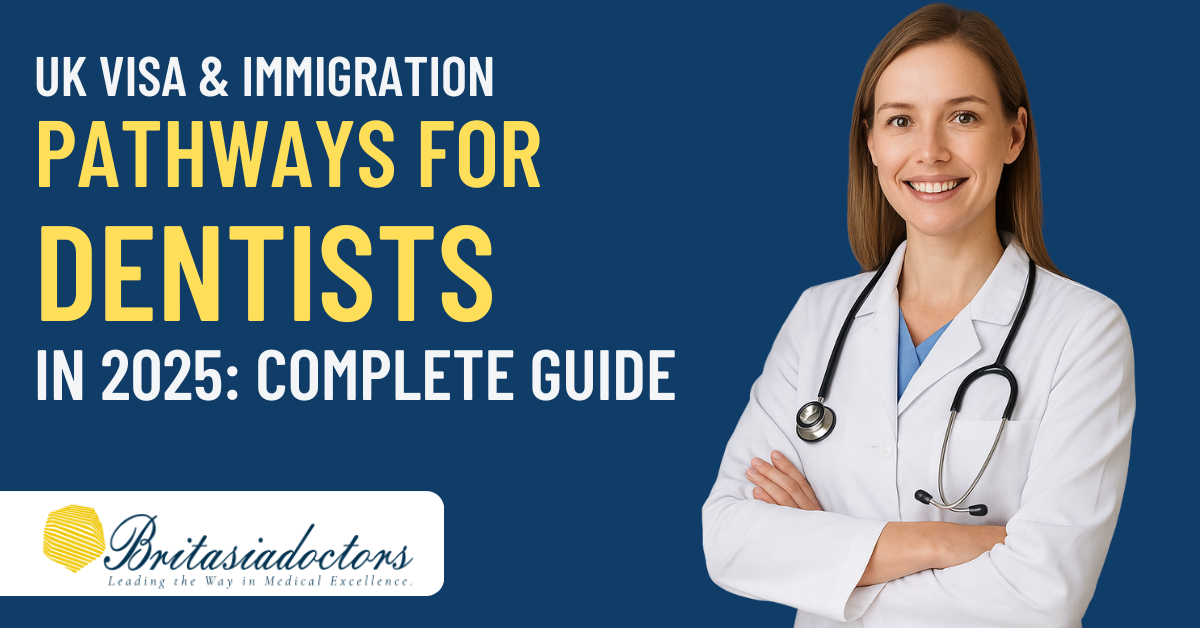
Introduction: The UK Dental Landscape in 2025
The United Kingdom continues to face significant dental workforce shortages in 2025, creating substantial opportunities for overseas dental professionals. According to recent data, approximately 30% of dentists practicing in the UK first qualified in other countries, highlighting the critical role of international talent in maintaining the nation’s oral healthcare system. NHS England has identified persistent shortages across multiple regions, with rural and underserved areas experiencing particular difficulties in recruitment and retention of qualified dental professionals.
For overseas dentists considering relocation, understanding the current UK immigration system is essential. Recent policy changes have reshaped the landscape, with specific implications for dental professionals at various qualification levels. This comprehensive guide outlines the latest visa pathways, registration requirements, and practical considerations for dentists looking to practice in the UK in 2025.
Key Visa Pathways for Dentists in 2025
Skilled Worker Visa
The Skilled Worker visa remains the primary immigration route for qualified dentists seeking to work in the UK. As of July 2025, significant changes to the Immigration Rules have affected eligibility criteria, particularly for dental support roles.
Key requirements for dentists:
- A job offer from a UK employer with a valid sponsor license
- Confirmation that your role meets the RQF level 6 requirement (degree-level)
- A Certificate of Sponsorship (CoS) from your employer
- Meeting the minimum salary threshold for your occupation
- Evidence of English language proficiency
- Sufficient personal savings to support yourself initially (unless exempted)
- Valid registration with the General Dental Council (GDC)
Dentists, dental surgeons, orthodontists, and periodontists remain eligible for sponsorship under this route, as these roles meet the RQF level 6 skill threshold.
Important 2025 update: On July 22, 2025, the UK government implemented changes to the Immigration Rules that removed certain dental care professional roles from sponsorship eligibility. Dental technicians, hygienists, and dental nurses are no longer eligible for new Skilled Worker visa applications unless they were already sponsored before this date.
Health and Care Worker Visa
The Health and Care Worker visa is a specialized category within the Skilled Worker route designed specifically for healthcare professionals, including dentists.
Benefits over the standard Skilled Worker visa:
- Fast-track processing
- Reduced application fees
- Exemption from the Immigration Health Surcharge (saving approximately £1,035 per year for the main applicant and each dependent)
- Dedicated support throughout the application process
Eligibility criteria:
- Job offer in an eligible dental role (dentist, dental surgeon, orthodontist, periodontist)
- Employment by an approved UK employer (NHS, an NHS supplier, or qualifying private practice)
- Certificate of Sponsorship from your employer
- Meeting minimum salary requirements for your role
- English language proficiency
- Sufficient personal savings (unless exempted)
- GDC registration (or eligibility to register)
Validity and conditions:
- Initial visa duration of up to 5 years
- Ability to extend your stay
- Option to apply for settlement after 5 years of continuous residence
- Permission to bring dependent family members (restrictions apply for certain roles)
Important 2025 update: As of March 11, 2024, care workers and senior care workers (SOC codes 6135 and 6136) can no longer include partners or dependents on their visas, except for children born in the UK. This restriction does not apply to dentists under the Health and Care Worker visa.
GDC Registration: Essential Requirements for Overseas Dentists
Registration with the General Dental Council (GDC) is mandatory for all dentists practicing in the UK, regardless of visa status. The registration pathway depends primarily on where you obtained your dental qualification.
For Dentists Qualified in the European Economic Area (EEA)
Under post-Brexit regulations, the UK continues to recognize EEA qualifications through a quasi-automatic process until 2028, provided the qualification was included in the EU professional qualifications directive (Annex V) before the end of 2020. After this period, the recognition process may change, and dentists are advised to monitor GDC updates for future requirements.
Requirements for EEA-qualified dentists:
- Evidence of your EEA dental qualification
- Proof of nationality
- Certificate of Good Standing from your current regulatory authority
- English language proficiency evidence
- Completion of GDC application forms and payment of registration fees
For Dentists Qualified Outside the EEA
Most non-EEA qualified dentists must pass one of two registration examinations before becoming eligible for GDC registration:
1. Overseas Registration Examination (ORE)
The ORE is a comprehensive assessment administered by the GDC, consisting of two parts:
Part 1: A written examination testing theoretical knowledge through multiple-choice questions
Part 2: A clinical examination assessing practical skills in various dental procedures
Key information for 2025:
- The ORE remains heavily oversubscribed, with approximately 6,000 overseas dentists currently on waiting lists
- The GDC has been directed by the government to increase exam capacity
- Applications must be submitted well in advance due to limited examination slots
- Candidates typically need extensive preparation and may require multiple attempts
- Total costs can range from £2,500-£3,500 for both parts, excluding preparation materials and courses
2. Licence in Dental Surgery (LDS)
The LDS is administered by the Royal College of Surgeons of England and serves as an alternative to the ORE. This examination follows a similar format to the ORE but may have different scheduling and administration procedures.
Special Provisions for Certain Countries
Dentists who qualified before the end of 2000 in Australia, New Zealand, Singapore, Malaysia, and South Africa may be eligible for direct registration without taking an exam. These applicants should contact the GDC directly to confirm their eligibility under this provision.
English Language Requirements
All overseas dentists must demonstrate English language proficiency through one of the following methods:
- International English Language Testing System (IELTS) with a minimum score of 7.0 overall and 6.5 in each section
- Occupational English Test (OET) with a minimum grade B in all sections
- Evidence of a primary dental qualification taught and examined entirely in English
- Recent dental practice experience in a majority English-speaking country
Comparison of Visa Pathways for Dentists in 2025
|
Feature |
Skilled Worker Visa |
Health and Care Worker Visa |
|---|---|---|
|
Eligibility |
Qualified dentists in roles at RQF level 6 |
Qualified dentists in healthcare settings |
|
Application Fee |
£625 to £1,423 (depending on length) |
£247 to £479 (reduced rate) |
|
Health Surcharge |
£1,035 per year per person |
Exempt |
|
Processing Time |
Standard 3 weeks |
Fast-track (typically 2 weeks) |
|
Minimum Salary |
£28,800 general threshold + occupation-specific rate |
Same as Skilled Worker visa |
|
Duration |
Up to 5 years initially |
Up to 5 years initially |
|
Extension |
Yes, multiple extensions possible |
Yes, multiple extensions possible |
|
Path to Settlement |
After 5 years continuous residence |
After 5 years continuous residence |
|
Dependents |
Yes, can bring partner and children |
Yes, can bring partner and children |
|
Switching Employers |
Requires new CoS and visa update |
Requires new CoS and visa update |
|
Supplementary Work |
Allowed within specific guidelines |
Allowed within specific guidelines |
Practical Steps for Dentists Considering UK Immigration
1. Assess Your Eligibility
Before beginning the application process, verify your eligibility for both GDC registration and the appropriate visa category:
- Check your qualification status against GDC requirements
- Determine if you need to take the ORE/LDS examinations
- Confirm your role meets the skill level requirements for sponsorship
- Assess your English language proficiency against required standards
2. Secure GDC Registration or Eligibility
- If EEA-qualified, apply directly to the GDC
- If non-EEA qualified, register for the ORE or LDS examination
- Begin exam preparation well in advance
- Budget for examination and registration fees
3. Find a Sponsoring Employer
- Research NHS and private practice opportunities
- Connect with dental recruitment agencies specializing in international placements
- Verify that potential employers hold valid sponsorship licenses
- Negotiate employment terms that meet visa salary requirements
4. Obtain a Certificate of Sponsorship
- Work with your employer to secure a valid Certificate of Sponsorship
- Ensure all job details match your qualifications and experience
- Verify the CoS includes all required information for visa application
5. Apply for the Appropriate Visa
- Determine whether the Skilled Worker or Health and Care Worker visa is most suitable
- Gather all required documentation
- Complete online application forms
- Pay relevant fees
- Attend biometric appointment if required
- Allow sufficient processing time before planned relocation
6. Prepare for Relocation
- Research housing options in your employment area
- Understand UK tax and national insurance requirements
- Arrange professional indemnity insurance
- Plan for initial living expenses
- Research banking and healthcare arrangements
UK Dental Job Market for Overseas Dentists in 2025
The UK dental sector continues to experience workforce shortages, creating significant opportunities for overseas dentists. Current market conditions include:
NHS Positions
- Persistent vacancies across multiple regions, particularly in rural and underserved areas
- Structured salary scales with clear progression pathways
- NHS pension scheme benefits
- Contractual arrangements typically based on Units of Dental Activity (UDAs)
- Growing focus on preventative care and quality metrics
Private Practice Opportunities
- Increasing number of practices seeking international talent
- Potentially higher earnings compared to NHS work
- Greater clinical autonomy and treatment flexibility
- Opportunities for specialist practice development
- Varied employment models including associate positions and practice ownership pathways
Salary Expectations
- NHS dentists: £40,000 to £78,000 depending on experience and location
- Private practice: £55,000 to £100,000+ depending on practice model and location
- Specialists: £70,000 to £120,000+ depending on specialty and practice setting
Regional Variations
- London and Southeast England typically offer higher salaries but with increased living costs
- Northern England, Wales, Scotland, and Northern Ireland may offer enhanced recruitment incentives in underserved areas
- Rural locations may provide additional support for international dentists including housing assistance and relocation packages
Frequently Asked Questions
Is the UK still hiring overseas dentists in 2025?
Yes. The UK continues to experience dental workforce shortages and actively recruits qualified international dentists. The removal of certain dental support roles from sponsorship eligibility has not affected the demand for fully qualified dentists, who remain on the shortage occupation list.
What is the minimum salary requirement for dentists under the Skilled Worker visa?
The minimum salary requirement combines the general threshold (£28,800 as of July 2025) with occupation-specific rates. For dentists, this typically results in a minimum required salary of approximately £36,000 per year for a full-time position, though exact requirements vary based on specific role and location.
How long does it take to complete the ORE process?
The complete ORE process typically takes 12-24 months from initial application to successful completion of both parts, depending on examination availability, preparation time, and individual performance. Current waiting lists may extend this timeline further.
Can I work as a dental therapist or hygienist while waiting for ORE completion?
As of March 2023, overseas dentists can no longer register as Dental Care Professionals (DCPs) without formal DCP qualifications. Additionally, these roles are no longer eligible for new sponsorship under the Skilled Worker visa as of July 2025.
What happens if I change employers after obtaining my visa?
If you change employers, you must obtain a new Certificate of Sponsorship from your new employer and update your visa. Your new employer must have a valid sponsorship license, and the role must meet all visa eligibility requirements.
Is the Immigration Health Surcharge waived for all dental professionals?
The Immigration Health Surcharge is waived only for those applying under the Health and Care Worker visa route and their eligible dependents. Those applying under the standard Skilled Worker visa must pay the surcharge, currently set at £1,035 per person per year.
Can I bring my family with me to the UK?
Qualified dentists can generally bring dependent partners and children to the UK under both the Skilled Worker and Health and Care Worker visa routes. Dependents must meet specific eligibility criteria and pay relevant application fees and, if applicable, the Immigration Health Surcharge.
Is there a faster route to GDC registration in 2025?
While the government consulted on introducing a provisional registration system for overseas dentists in 2024, this proposal was not implemented. Instead, the government directed the GDC to increase examination capacity for the standard ORE process.
Conclusion: Next Steps for Overseas Dentists
The UK continues to offer attractive opportunities for qualified international dentists in 2025, despite some tightening of immigration rules for dental support roles. The combination of persistent workforce shortages, competitive salaries, and professional development opportunities makes the UK a desirable destination for dental professionals seeking international experience.
To maximize your chances of successful relocation:
- Start early: Begin the GDC registration process as soon as possible, particularly if you need to complete the ORE or LDS examinations.
- Build your network: Connect with dental associations, recruitment specialists, and fellow international dentists to gain insights and potential employment leads.
- Develop your English skills: Invest in comprehensive English language preparation, focusing on both clinical communication and everyday fluency.
- Research specific regions: Consider opportunities beyond major cities, as rural and underserved areas may offer enhanced packages for international recruits.
- Prepare financially: Budget for examination fees, visa costs, initial living expenses, and potential periods without income during the registration process.
- Seek professional advice: Consider consulting with immigration specialists familiar with healthcare professionals’ pathways to ensure compliance with the latest requirements.
By taking a methodical approach to the registration and immigration process, overseas dentists can successfully navigate the pathway to UK practice, contributing valuable skills to the nation’s healthcare system while advancing their own professional careers.
This guide represents information accurate as of August 2025. Immigration rules and registration requirements are subject to change. Always verify current requirements with official sources including the Home Office, General Dental Council, and NHS Employers before making relocation decisions.




